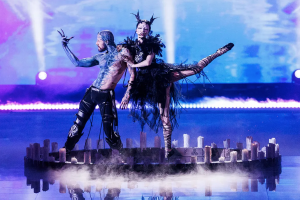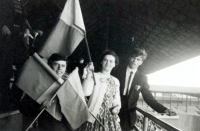‘The Witch’ breaks Ireland’s Eurovision dry spell
 Bambie Thug’s explosive performance in Tuesday’s Eurovision semi-final has cemented their place in this weekend’s final, making them the first Irish act to do so since 2018.
Bambie Thug’s explosive performance in Tuesday’s Eurovision semi-final has cemented their place in this weekend’s final, making them the first Irish act to do so since 2018.
What’s more, they’re predicted to do well; in a competition half-defined by its affinity for camp and spectacle, an act like Bambie’s is promising, and the outpouring of praise for their act since Tuesday is yet another positive indicator.
Put together, and especially within the context of our dwindling Eurovision relevancy, Bambie’s achievements this week – no matter Saturday’s outcome – are significant. And yet, while they may be getting their flowers on the international stage, here at home Bambie continues to be regarded with a certain degree of controversy.
‘Not my Eurovision hopeful’
For an artist whose de-jure on-stage fashion includes dramatic gothic make-up, striking silhouettes, horns and crystal-adorned antlers, and whose self-described “hyperpunk avant electro-pop” music is a stark contrast from the usual playlist of RTÉ Radio 1, it’s almost odd to think neither of these things are the most controversial part about Bambie Thug’s act. Because they aren’t… any more at least.
The pearl-clutching you’d expect from certain factions of Irish society over an artist like Bambie being selected to represent the country did indeed fuel a lot of initial backlash, with many criticising their style, pagan-based belief system, and personal gender identity. But by now, the bigger criticism isn’t their identity (thankfully) or the type of performer they are, but the fact they’re choosing to perform at all.
Israel at Eurovision
In general, this year’s Eurovision competition has carried an air of controversy from the off, with the subject of Israel’s participation being a major flashpoint.
Given the ongoing atrocities in Gaza, the EBU, who run Eurovision, has faced a lot of backlash for allowing Israel to compete – even more so considering they banned Russia in 2022… a day after they invaded Ukraine. And even more so again when the Israeli act’s song (originally named ‘October Rain’ in a not-so-thinly-veiled reference to October 7th) was forced to be reworked to remove its political messaging.
EBU Director General Noel Curran defended the decision, explaining Eurovision is a competition between broadcasters, not countries, and attributing the Russia-Israel banning discrepancy as being due to the Russian broadcaster’s notoriety for misinformation and propaganda… a charge not applicable to Israel, apparently. Domestically, pressure then shifted to our own broadcaster, RTÉ, with calls for Eurovision not to be aired, which (quite surprisingly given how squeaky clean RTÉ’s current reputation with the public is) were not fulfilled; full coverage filled Irish screens on Tuesday, and will surely do so again this Saturday.
And so, in the absence of any stance-taking from the EBU and RTÉ, at-home pressure began to be directed at Bambie Thug themself, with an outpouring of calls for them to boycott. This pressure peaked in the lead up to Tuesday, but it’s still there – renewed with the perspective that at this final stage, a dramatic boycott would only be more impactful.
And it feels as though the public feel particularly emboldened to ask Bambie to do this, to shy away from the biggest moment of their career and risk being demonised and/or falling into obscurity because of it; as if they feel more emboldened to ask this of Bambie than they would another artist. And why? Well, because even Bambie themself is in favour of it… sort of.
Does Bambie owe it to boycott?
During a Late Late Show appearance, Bambie confirmed that while they condemn Israel, they’re going through with competing to ensure a strong pro-Palestine presence at Eurovision.
At the same time, they expressed support for those boycotting – even saying that if they weren’t performing, they would too. This last part didn’t sit well with many, who claimed if anything, such a statement was damning; evidence the artist’s appetite for “five minutes of fame” was worth more than their principles.
And yes, it would’ve been almost refreshing to have the quiet part said out loud, to have Bambie tell Patrick Kielty part of the reasoning behind their choice was that they’ve worked hard to reach this milestone, that they felt they deserved to perform after all they went through after qualifying, that they didn’t want to give it all up for what might’ve well been a quickly-forgotten-about boycott.
Bambie has expressed they’ve a lot they’re standing for, and you get the sense they’re finding the balance difficult, since boycotting would mean losing the platform to advocate for other issues they value – take the trans flag-inspired outfit they sported on Tuesday. And it certainly means something significant to have an alternative, queer artist on stage for Ireland.
And yet still, perhaps even more so, I do think it would’ve signalled something meaningful on their part if Bambie had boycotted. It would’ve spoken to the strength of their principles and what they were willing to sacrifice for them.
But, realistically, in terms of Gaza and the cause of Palestinian liberation… would it actually have achieved anything?
To protest or not to protest?
Protest, its different forms and its efficacy, has formed a common thread in Irish news lately. The ongoing saga at Trinity over students’ protests (again relating to Gaza) has begun to yield results in students’ favour, and hence the whole thing has been heralded as proof protest is still alive and well – and crucially, something that works.
But the general idea of a protest’s merits, particularly in a modern landscape, is murky business. There is an ever-thinning line between sincerely committing to a stance, and just doing the ‘done thing’ to align with progressive politics – at which point, it becomes more about virtue signalling than anything.
Students camping outside the Book of Kells to protest their college’s Israeli ties, directly hindering the institution from profiting off one of its biggest cash cows, is a protest whose potential to work is evident. The likelihood Bambie boycotting would’ve any sort of direct impact like that is much more ambiguous.
Whatever anyone’s intentions, I fear boycott from Bambie, or Ireland, would’ve been effectively symbolic. Sure, it might’ve garnered some attention and discussion, but with the Eurovision being so massive, a single act’s absence is ultimately negligible. It alone was never going to enact tangible change, change anyone’s mind. Ireland would get its ‘pats on the back’s from agree-ers, rolled eyes from disagree-ers, and that would’ve been that.
You could argue it might’ve tiggered more acts boycotting, and a mass boycott is where the real impact would’ve been. I can understand that. But I can’t help thinking that in any case, it’s so odd the focus has become the acts – not the broadcasters.
Can you have an ‘apolitical’ Eurovision?
In defending Israel’s participation despite Russia’s ban, EBU’s Curran said, “Comparisons between wars and conflicts are complex and difficult and, as a non-political media organisation, not ours to make”.
Per the EBU, the Eurovision is apolitical… or as apolitical as a competition founded on ‘bringing countries together despite geopolitical tensions’ can be.
But it’ll be especially hard for this year’s competition to come off as such, given not just Israel’s participation but the enforced absence of anything pro-Palestinian; only participating countries’ flags are allowed at the event (aka Israel’s but not Palestine’s), and any supporting political messaging is a no-go, no matter how subtle – before Bambie’s Tuesday performance, they were ordered to change the ogham writing spelling ‘ceasefire’ and ‘freedom for Palestine’ that formed part of their make-up.
The argument to keep the Eurovision about ‘the music’ and about ‘unity through art’ is not new, arising every time politics have seeped into the competition before. And criticising the EBU for prioritising this, for prioritising the ‘glitz of it all’ over serious issues, can only go so far – after all, by framing so much of the mainstream conversation about Gaza through how it should affect a singing competition, are we not doing the same thing? Getting distracted by the light-heartedness Eurovision offers, and ignoring the serious issue?
Yes, ‘artwash’ing is a thing, and it’s always important to be wary of the impact ‘playing nice’ with everyone can have in making certain things appear acceptable. But it’s time the national conversation about Gaza moved away from Eurovision, so deeper ones can be had.
I am interested to see how Bambie fares on Saturday, as I’m sure the whole country is. And who knows – perhaps, even if ‘the witch’ isn’t crowned, they can do more with their success now than their boycotting ever would’ve.






